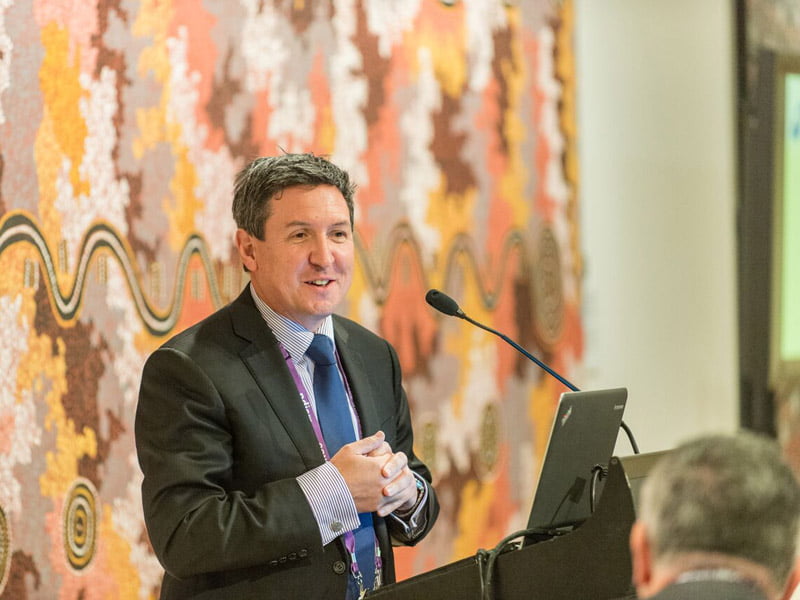The idea of smart cities has been around for a decade or more. In recent years, with the rise of the Internet of Things, the term has increasingly become associated with massive arrays of sensors, generating big data about things like traffic management, power consumption, water management and the like.
The idea is that technology can help us manage all these things better and make the urban environment work more efficiently and be a better place to live.
But one thing is missing from this view of smart cities, says SAP’s Brian Lee-Archer. That is the human element. Smart cities are not about technology, they are about people, he says.

Mr Lee-Archer is Director of SAP’s Institute for Digital Government, a global initiative based in Canberra. He will speak at InnovationAus.com’s Intelligent Communities 2017 event, to be held in Melbourne on 17 March.
“The human aspect is often overlooked when talking about smart cities,” he says. “If you ask most people what they understand by ‘smart cities’, they will mention the technology, but the technology is no good if it does not meet people’s social needs.”
Mr Lee-Archer says much of the discussion about smart cities globally as focussed on the urbanisation process in the developing world and how best to manage the growth problems of emerging megacities.
“That debate is irrelevant to Australia,” he says. “Australia is already one of the most urbanised countries in the world, and that movement to the cities happened decades ago.”
That is one of the reasons, he believes, why smart cities as a concept had never really resonated in Australia.
“Compared to most countries, Australia has an equilibrium. Our cities are growing, but there are also many regional cities and country towns were the technologies and the social issues are just as important. We want to shift the narrative.
“We have three levels of government in Australia. There are over 500 local government authorities, many of them very small. We need to be talking about all sizes of cities, not just the larger ones.”
He says that was what attracted him to the InnovationAus.com Intelligent Communities events (another is being held in the Victorian regional city of Bendigo on 15 March).
“It’s not about cities. It’s about communities, and communities are about people,” Mr Lee-Archer said.
“Everybody is talking about big data and open data and generating and sharing information. But the real issue is ensuring that information is accessible and usable, and then working out how to take advantage of it. How is public value created? It’s not just service delivery, it’s also about good public policy, and translating that policy into real benefits for people.
“That’s particularly relevant for smaller communities and smaller local government authorities. They need the skills to analyse the data, so they can build an investment case to the two higher levels of government.”
He says the open data debate often misses this important point. “It’s not just about dumping data in a repository and ticking the box that you have done open data. It means good analytics and ensuring the data is usable to all stakeholders.”
InnovationAus.com asked Mr Lee-Archer what was in this for SAP. “I often get asked that question,” he says. “Where’s the commercial advantage? We want to help create an environment of trust and confidence. If we don’t do that, we don’t have a market for our products. It’s that simple.
“We really want reshape the narrative of smart cities, which has been dominated by the technology industry over recent years, towards a more rounded discussion on intelligent communities that addresses technology, social capital and governance issues.
“The smart city agenda has concentrated on the issues of mass urbanisation, but there remains a significant number of people in countries like Australia who are not living in major cities.
“As the big cities grow, the viability of these potentially excluded communities becomes important – they contribute to an ecosystem of supply chains providing labour, goods and services that support the larger population centres.”
“In a country as diverse as Australia, from mega cities such as Sydney and Melbourne through to small country towns and rural communities, a one-size-fits-all approach towards a smarter city isn’t effective. The investment path towards an intelligent community needs to be tailored according to individual needs and circumstances.
“The 21st century smart city concept is often dominated by a technology centred agenda. This carries the risk of overlooking vital aspects of what makes communities viable in Australia – population, employment opportunities and social capital.
“While digital technology will be important in transforming the way cities and communities function, success comes from the political, economic, and social factors.”
More information about the InnovationAus.com Intelligent Communities events will be held on 15 March in Bendigo and 16 March in Melbourne can be found at www.innovationaus.com/events/
Do you know more? Contact James Riley via Email.

